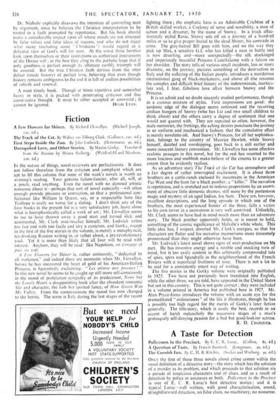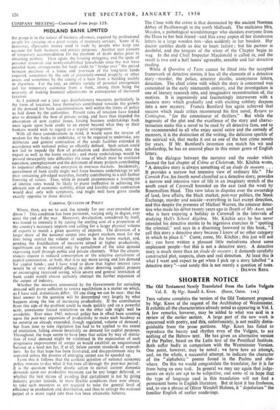A Taste for Detection
ONLY the first of these three novels about crime comes within the usual definition of a detective story—the story which has the solution of a murder as its problem, and which proceeds to that solution via a parade of suspicious characters and of clues, and as a result of detection by police or amateurs or both. Policemen in the Precinct is one of E. C. R. Lorac's best detective stories ; and it is typical Lorac—well written, with good characterisation, sound, straightforward detection, no false clues, no machinery, no nonsense. The Close with the crime is that dominated by the ancient Norman Abbey of Paulborough in the north Midlands. The malicious Mrs. Mayden, a pathological scandalmonger who slanders everyone from the Dean to her best friend—and files away copies of her slanderous letters in a large wooden box—dies suddenly in her boudoir. Her doctor certifies death as due to heart failure ; but his partner is doubtful, and the tongues of the wives of the Chapter begin to wag. In the end Chief Inspector Macdonald is called in, and the result is two and a half hours' agreeable, sensible and fair detective reading.
While A Question of Taste cannot be fitted into the accepted framework of detective stories, it has all the elements of a detective story—murder, the police, amateur sleuths, anonymous letters, detection. The chief crime with which the story is concerned was committed in the early nineteenth century, and the investigation is one of literary research into, and imaginative reconstruction of, the motives. It is ingeniously and fascinatingly interwoven with a modern story which gradually and with exciting subtlety deepens Into a new mystery. Francis Bamford has again achieved that success which made critics recommend his first novel, Return to Cottington, "for the connoisseur of thrillers." \ But while the ingenuity of the plot and the excellence of the story and charac- terisation make this a novel to be read by all detective fans, and to be recommended to all who enjoy social satire and the comedy of manners, it is the distinction of the writing, the delicious sparkle of the satirical wit, that marks it out as one of the best crime novels for years. If Mr. Bamford's invention can match his wit and scholarship, he has an assured place in this minor genre of English letters.
In the dialogue between the narrator and the reader which formed the last chapter of Crime at Christmas, Mr. Kitchin wrote, "A detective story is always something of an etude de moeurs. . . . It provides a narrow but intensive view of ordinary life." The Cornish Fox, his fourth novel classified as a detective story, provides a narrow and intensive view of life in an imaginary stretch of the south coast of Cornwall bounded on the east (and the west) by Rosemullion Head. This view takes in disputes over the ownership of land, love affairs, the black market, post-war politics, the Stock Exchange, murder and suicide—everything in fact except detection, and this despite the presence of Michael Warren, the amateur detec- tive who made his debut twenty years ago in Death of My Aunt, and who is here enjoying a holiday in Cornwall in the intervals of studying Hall's School Algebra. Mr. Kitchin says he has never intended his detective stories to be ingenious exercises in "spotting the criminal," and says in- a disarming foreword to this book, "I call this story a detective story because I know of no other category In which to place it." Come, come, Mr. Kitchin ; this just will not do ; you have written a pleasant little melodrama about some unpleasant people—but this is not a detective story. A detective story is much more than an etude de moeurs; it demands carefully constructed plot, suspects, clues and real detection. At least this is what I want and expect to get when I pick up a story labelled "a detective story "—and surely this is not merely a question of taste.
- DILWYN REES.











































 Previous page
Previous page